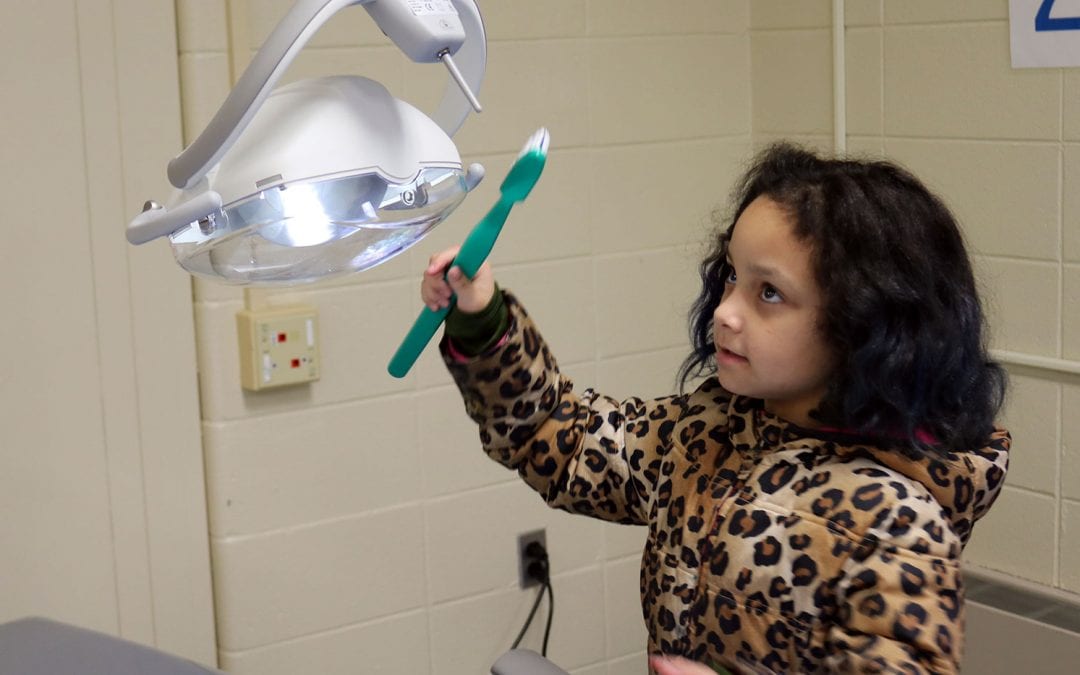A student at Burlington County Special Services School District practices visiting the dentist during an on-campus simulation
“Teachers from all eight of our districts are out in the community, identifying needs and then working to form programs and partnerships to help address those needs. They are initiating changes that will make life easier, make life better, for the individuals and families they serve,” said Dr. Howard Lerner, chairman.
Most medical visits are anxiety-inducing for any child: a new place, new faces, people poking around with bright lights, and loud noises. For a child with sensory processing and communication deficits, all of this can simply be too much, making treatment difficult and causing stress to the child, their loved ones and the provider. “It sometimes has to be a matter of life and death before parents will bring their child to an Emergency Room for help,” explained Anne Finley, Supervisor of the Transitional Living Skills Program at Atlantic County Special Services School District, about the challenges associated with seeking emergency medical care for special needs children.
Fortunately, medical professionals and first responders are becoming more aware and accommodating when treating special needs patients. Innovative programs and unique partnerships between member districts of the New Jersey Joint Council of County Special Services School Districts and the healthcare community are part of this change across the state, resulting in improved care for an important sector of the population.
Helping Pave the Way through Information and Education
The teachers and staff at Atlantic County Special Services School District not only care for more than 300 enrolled students, but also extend their expertise to reach those far beyond the campus. The district’s occupational and speech therapists recently started working with Shore Medical Center in Somers Point to help hospital staff better provide for individuals with special needs, particularly children on the autism spectrum who have sensory processing and communication deficits. In September, the therapists toured the hospital’s Emergency Room and Pediatric ER to assess the spaces and make recommendations to help the hospital take a proactive approach in providing specialized care. A plan emerged to create a less-stressful setting for sensory-sensitive patients and also train employees on how to better communicate with and respond to patients with special needs. “The way the ER is set up, there are a lot of loud noises, bright lights and other stimuli that can trigger anxiety and fear,” said Anne Finley, who has been instrumental in the project. “The hope is to reduce this anxiety that can potentially lead to behavioral problems and outbursts, which can be traumatic for the patient, their family and those trying to render care.”
ACSSSD and Shore Medical staff have identified a room in the pediatric ER that is less trafficked to serve as a sensory-friendly treatment area. Modifications are needed to make it a more welcoming space by relocating less critical items like pamphlets, signs and gloves to hallway walls or medical carts. Other changes like painting walls a soothing color, putting lights on a dimmer, and adding stress balls and an interactive puzzle wall are further recommendations to make the room more inviting for special needs patients.
“Another important part of the plan deals with communication,” said ACSSSD Child Study Team Supervisor Jennifer Cruickshank, who also is helping with the project. “These patients have different levels of verbalization skills, and it can be difficult for patients, their parents and medical staff because the children often have trouble explaining what’s wrong or understanding what’s going to happen.” To help facilitate better communication, ACSSSD speech therapists are working with hospital staff to develop a more picture-based system that will help patients relay how they’re feeling, their pain levels and their needs. The system will also be used to help patients better understand what’s going to happen, like getting blood drawn or what to expect during other routine procedures. “Utilizing pictures is a pretty standard way of communicating, and we hope that since it’s familiar, it will help the patients feel more comfortable and help de-escalate situations,” said Cruickshank.
Nurses and hospital staff want word to spread about the new space they’re planning to create and the specialized training they’ve received so parents won’t hesitate to bring their children in for help.
Recognizing the Needs and Meeting Them
Gloucester County Special Services School District recently entered its own partnership with Rowan University School of Osteopathic Medicine to provide space for the first special needs primary care facility in Southern New Jersey. The Rowan Integrated Special Needs Center (RISN) is currently operating at the Bankbridge Development Center in Sewell in a space the district donated to allow for an earlier-than-anticipated start date. While the program will be housed in a brand-new building that’s going up at the Rowan College of South Jersey – Gloucester Campus, those involved in the project know how badly care is needed and didn’t want to wait to start offering services.
“Right now, patients are traveling out of state to get care, and we need to change that,” said Dr. Jennifer LeComte, director of the RISN Center.
“Having this facility as part of our campus is really key, because the kids are already familiar with the building, which is so important for them,” said GCSSSD Superintendent Michael Dicken. He anticipates keeping space for RISN at Bankbridge even after the center moves into its new building. “We are so happy to be a part of this mission.”
RISN offers routine primary and preventative care and women’s services to patients with physical, intellectual and developmental disabilities, and offers the same care to their families. RISN providers want to establish a strong relationship with patients and care for them from adolescence through adulthood. They also want to help their patients with “healthcare readiness,” by teaching them how to call to schedule appointments and refill prescriptions. The medical team’s hope is to also expand services to include things like dentistry, podiatry and occupational therapy to offer comprehensive, integrated care.
Another win-win, thanks to the partnership, is that Rowan medical students get experience working with special needs patients — exposure that can be hard to come by, but is crucial for expanding care. “We aren’t just treating patients here, we are expanding the workforce,” said Dr. LeComte. “Our hope is that medical students involved in the program will go out into their own communities upon graduation and be better equipped to serve special needs patients.”
Setting Students up for Success
Being prepared for a visit to the doctor or dentist is often key for a successful experience, and it is something the staff at the Burlington County Special Services School District works on with special needs children who attend school there or use the facility’s respite services. The school has set up a mock dentist office, doctor’s office and even a barber shop to help familiarize children in preparation for a real-world visit. “Through exposure and experience, we want to make them more comfortable heading into a visit so it can be a positive experience,” said Adell Valasek, supervisor of education at BCSSSD’s Middle School Campus. An expert in the field of Autism, Valasek even travels to Belgium every year to help the International School of Brussels with their program. When working with students here in Burlington County, she says it’s also important to make sure the parents are involved so it’s a more authentic experience. “Sometimes kids will perform a task or be comfortable in a situation when I’m there, but we need to make sure that this behavior translates to outside of the school. I’ve had parents crying tears of joy because their children can now go get a haircut or go get their teeth cleaned and have it be a positive experience.”
Practice with real-life scenarios is also the foundation on which Warren County’s H.I.L.L.S. House was built. A partnership with Warren County Special Services School District and Centenary University, the mission of H.I.L.L.S. House is to help individuals learn life skills, and it does so by providing students with positive learning experiences.
“The goal is to get them to their highest level of independence,” said H.I.L.L.S. House manager Janet Cunningham. “We want them to learn as much as they can so they are comfortable and familiar with doing basic things like laundry, vacuuming and making beds, but also other things that are important to being independent.”
Health and safety are big parts of that, and to help educate the students about how to handle an emergency, H.I.L.L.S House partnered with the Warren County Office of Emergency Management and Warren County Fire Marshall’s office. The students learn important, and sometimes life-saving, skills like how to use a fire extinguisher or make a 9-1-1 call. They even practice placing an emergency call so they understand what kind of information they need to provide when seeking help. Through this partnership, homes where individuals with special needs live can be flagged, alerting first responders to potential sensitivities and allowing them to approach residents appropriately.
“It’s helpful for emergency responders to know if a child is non-verbal or if they have sensory issues so they know not to use lights or sirens when pulling up to the home,” said WCSSSD Superintendent Joseph Flynn. “It’s really great, because it not only helps the students learn how to deal with these potential scenarios, but it also helps our police, fire and dispatch professionals better respond and interact.”
Trusted Experts Helping Make the Change
The dedication and expertise of teachers and staff at New Jersey’s county special services school districts are the driving force for many of these initiatives. “Our educators’ devotion to their students doesn’t end at 3 p.m. on Friday,” said Dr. Howard Lerner, chairman of the New Jersey Joint Council of County Special Services School Districts and superintendent of Bergen County Special Services School District. “This is their calling; they are committed to helping students with special needs and their families thrive beyond the campus walls. Teachers from all eight of our districts are out in the community, identifying needs and then working to form programs and partnerships to help address those needs. They are initiating changes that will make life easier, make life better, for the individuals and families they serve.”
It’s that passion that is helping drive these important changes so that special needs patients throughout the state get the care they need – and deserve – right in their own backyards. The Joint Council helps to foster discussions among member districts that lead to additional programs and partnerships –and greater awareness of existing ones – so that this shift in the healthcare world continues to gain momentum.

